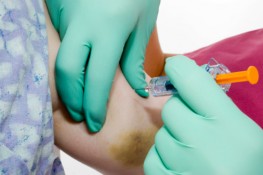Medication Errors Often Involve Blood Thinners
14June2013
14June2013

Blood thinners account for approximately 7 percent of all medication-related errors involving hospitalized patients, according to a new analysis published in the Annals of Pharmacotherapy.
Hospitals often use blood thinners to reduce the risk of heart attack or stroke by preventing blood clots in arteries and veins. There are two types of blood thinners: anticoagulants and anti-platelet drugs.
Recently, the Anticoagulation Forum announced new guidelines for the use of anticoagulants. The Anticoagulation Forum includes healthcare experts who are focused on improving anticoagulant care. According to the organization, there should be standardized dosing protocols for anticoagulants and blood thinners on every hospital floor, and these protocols should be accessible through the electronic medical record system.
The researchers also said that having a pharmacist during patient rounds can also help reduce the risk of medication errors by as much as 70 percent.
The Anticoagulation Forum recommends that every hospital have:
The medical malpractice lawyers at Morrow Kidman Tinker Macey-Cushman, PLLC represent victims of medical negligence by doctors, nurses, technicians, and other medical personnel in Seattle and across Washington.
Source: